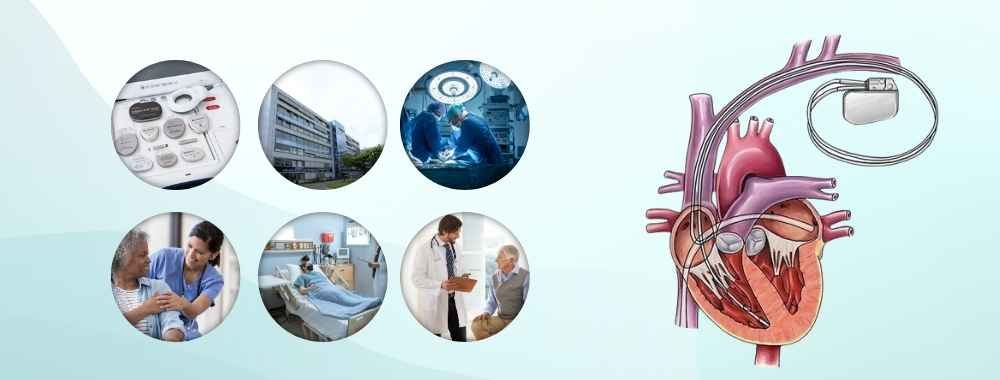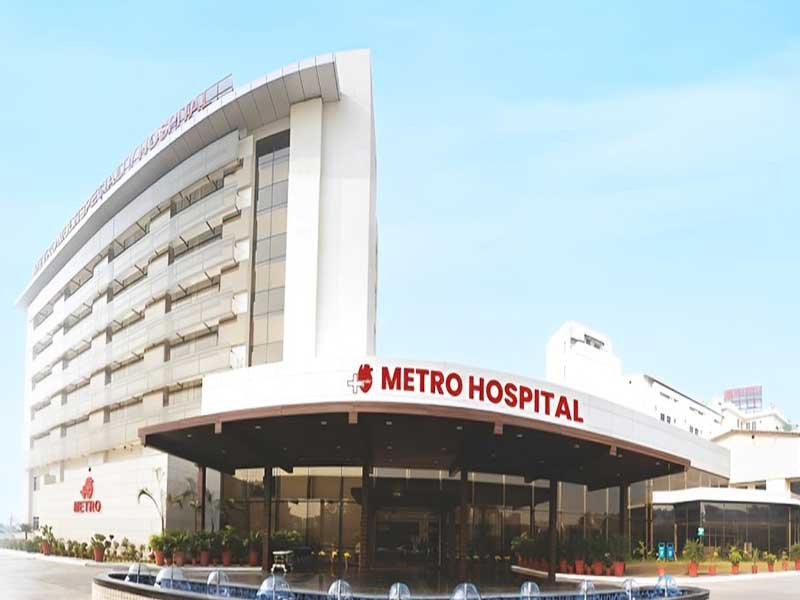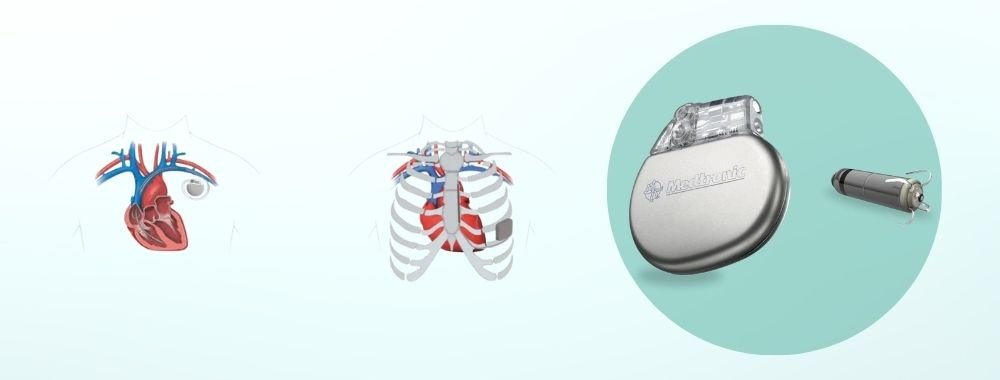Home Treatments Cardiology ICD Implantation
Are you concerned about irregular heart rhythms?
Living with a heart condition can be challenging, especially with the ongoing risk of sudden cardiac events.
Without timely intervention, these conditions not only increase health risks but can also bring added stress, impacting your peace of mind and overall quality of life.
In India, skilled cardiologists in well-equipped facilities offer ICD (implantable cardioverter defibrillator) implantation, providing patients with dependable heart care for a safer, healthier life.

ICD implantation is performed when patients have survived sudden cardiac arrest due to ventricular fibrillation or fainted due to ventricular arrhythmia.
In case of heart failure or problems with the contraction of the heart including abnormal ventricular ejection fraction, the ICD implantation procedure will be processed.
In India, the cost of ICD implantation takes in device charges, pre-surgery tests, surgeon’s fees, hospital stay, and post-surgery follow-up, making it an affordable choice for full cardiac care.
Cost Component | Details | Estimated Cost in USD |
Pre-operative Consultation & Diagnosis | Consultations, X-rays, MRI scans, blood tests | |
Surgery Costs | Includes surgeon fees, type of surgery, and hospital stay | |
Rehabilitation and Follow-up | Physiotherapy sessions, medications, supportive devices, follow-up visits |

Country | Cost Structure |
India | |
United States | |
Germany | |
Turkey |
◾Key Takeaways
✅ Affordable Treatment Costs: ICD implantation in India offers high-quality care at a more affordable cost. With experienced doctors and well-equipped hospitals, patients can access reliable treatment, making it an accessible option for heart care.
✅ Advanced Medical Technology: India uses advanced technology to monitor and control irregular heart rhythms. These devices respond quickly to heart issues, helping to prevent serious cardiac issues and improve patient safety.
ICD Implantation cost
Treatment Name
Estimated Cost
Single Chamber ICD 12000-13000 USD Dual-Chamber ICD 16000-17000 USD
India has highly regarded doctors for ICD implantation, recognized for their expertise and trusted reputations. These specialists provide experienced, high-quality care, making India a good choice for heart treatments.
Beds: 539
New Delhi
Beds: 230
New Delhi
Beds: 710
New Delhi
Beds: 650
New Delhi
Beds: 191
New Delhi
Beds: 310
New Delhi
Beds: 299
Gurugram
Beds: 380
New Delhi
Beds: 402
New Delhi
Beds: 1300+
Gurugram
Beds: 1000
New Delhi
Beds: 450
Faridabad
Beds: 675
New Delhi
Beds: 500
New Delhi
Beds: 400+
Faridabad

Max Super Speciality Hospital, Saket

Aakash Healthcare Super Speciality Hospital

Indraprastha Apollo Hospital

BLK Max Super Speciality Hospital

Dharamshila Narayana Superspeciality Hospital

Fortis Escorts Heart Institute

Fortis Memorial Research Institute

Manipal Hospital Dwarka

Max Super Speciality Hospital Shalimar Bagh

Medanta - The Medicity Hospital

Moolchand Kharaiti Ram Hospital

Sarvodaya Hospital

Sir Ganga Ram Hospital

Venkateshwar Hospital

Metro Heart Institute with Multispecialty
India has top hospitals for ICD implantation, equipped with advanced facilities and a focus on patient care. These hospitals offer dependable heart treatments, safety, and thorough patient support.

Necessary Diagnostic Tests
Tests | Description |
Electrocardiogram (ECG) | Measures the heart’s electrical signals to detect irregular heart rhythms. |
Echocardiogram | Uses ultrasound to see the heart’s structure and pumping ability, identifying any weakened areas. |
Holter Monitor | A wearable ECG that records the heart’s rhythm over 24-48 hours to catch irregular patterns that might not appear in a single test. |
Stress Test | Monitors heart function during physical activity to check for any rhythm issues started by exercise. |
Electrophysiology Study (EPS) | Maps the heart’s electrical pathways, any areas causing abnormal rhythms. |
Cardiac MRI | Provides detailed imaging of the heart to detect any scarring or damage that leads to dangerous rhythms. |
Blood Tests | Evaluate overall health and check factors like electrolytes and kidney function that may influence the decision to use an ICD. |
🟢Do’s Before Surgery
✅ If advised, don’t eat or drink for a specified time before the procedure.
✅ Only take medications your doctor has approved, and follow any specific dosage instructions.
✅ Inform your doctor of any allergies, health conditions, or past surgeries for safe treatment.
🔴Don’ts Before Surgery
❌ Unless advised otherwise, don’t take aspirin or blood thinners, because they increase bleeding risk.
❌ Avoid smoking and drinking before the procedure, these affect anesthesia and recovery.
❌ Don’t ignore any pre-surgery guidance from your doctor; it helps ensure a smooth procedure and recovery.
Now, for those who want to know about the ICD implantation procedure here are the details:
Before the Surgery
During the Surgery
After the Surgery
Hospital Stay and Recovery Time

Complications | Description |
Infection | This can range from irritation to a severe infection that may require the removal of the ICD leads. |
Bleeding | Bleeding can happen at the implant site or near the heart and, may be life-threatening. |
Damage Blood Vessels | Blood vessels may be damaged where the wires are inserted or in the vein where the ICD leads are placed. |
Pneumothorax | Air can become trapped in the chest, causing a lung to damage. |
Dislodged Leads | Leads can move from their original position, sometimes requiring another procedure to reposition them. |
Mechanical Problems | The ICD may fail to correct irregular heart rhythms if there are mechanical problems. |
Twiddler’s Syndrome | The ICD or pacemaker leads can twist, leading to device malfunction. |
Cardiac Perforation | In rare cases, the ICD leads can shift and tear or puncture the heart muscle. |
Why Choose Mejocare for ICD Implantation in India?
✅ Team of Top Cardiologists: We recommend that doctors have more than 25 years of experience.
✅ Accredited Hospitals: We have partnered with JCI/NABH Hospitals that offer state-of-the-art facilities equipped with the latest technologies such as robotics, machine learning, and cutting-edge diagnostic and therapeutic equipment to provide comprehensive and personalized care.
✅ Other Benefits: We provide, swift and detailed responses, accurate cost estimates, help with obtaining medical visas, accommodation in India, and priority appointment scheduling with the doctors. Moreover, we also facilitate your smooth arrival in India, with airport pickup, drop at the hotel, hospitalization assistance, and much more.
The ICD implantation procedure helps to recover heart rhythm by planting an ICD device in the chest which will monitor heart rhythm. This procedure is processed when an individual's heartbeat becomes dangerous, so the ICD device delivers a small electrical current that will reset the heart rhythm. ICD device helps to control life-threatening heart conditions and prevent from experiencing sudden cardiac arrest.

Medically Reviewed By
Dr. Aryan Malhotra is a highly respected and compassionate medical professional with a strong academic background. He holds an MBBS and MD degree from DTMU University in Georgia. Driven by a deep sense of duty, he is dedicated to providing exceptional care to his patients.
Most individuals undergoing an ICD implant typically require a hospital stay of about 4 to 5 days.
Around 4 to 6 weeks post-surgery, you may find yourself ready to return to work or resume your usual routine. Your doctor will discuss the frequency of your ICD checkups with you.
The survival rates for implantable cardioverter-defibrillators (ICDs) in India are promising, with a 92% survival rate at the end of the first year and a 68% survival rate at the end of five years after implantation.
When getting an Implantable Cardioverter Defibrillator (ICD), it's important to know the potential risks. These might involve infection, swelling, bleeding, bruising, possible damage to blood vessels from ICD leads, life-threatening bleeding around the heart, regurgitation at the lead site, a collapsed lung (pneumothorax), and in rare instances, cardiac perforation. Understanding these risks is crucial when considering this procedure.
Yes, it is necessary to have a companion.
after an ICD implant in India, it's safest to wait until the wound heals completely before traveling. This helps reduce the risk of infection or issues with the implanted device. Flying might be possible after about 2 days for simple implantation, but ensure there are no complications like pneumothorax before considering air travel.
Yes, you can do your own research and choose your physical therapist.
Medications commonly utilized for treating neuropathic pain include systemic analgesics such as opioids, topical lidocaine, gabapentin, pregabalin, and specific types of antidepressants.
Yes, insurance companies include.
You can typically expect to return to your routine around 4 to 6 weeks following surgery. Your doctor will guide you on the frequency of ICD checkups. It's important to take precautions when handling electrical appliances for safety purposes.
To discover the top doctors or hospitals in India, you can visit our website, mejocare on the doctors' page, you can filter and find the finest doctors, while on the hospital page, you can identify the best hospitals. Additionally, you can reach out to us, and we will gladly offer you all the necessary suggestions and information you need.
Typically, the ICD implant procedure spans approximately 1 to 2 hours.
No, there is no waiting list for ICD Implant in India.
Before the surgery, some tests might be required, such as an electrocardiogram (ECG), blood tests, and a chest X-ray.
You'll be under general anesthesia, ensuring you remain unconscious and comfortable. While the success of the procedure is monitored and blood flow to the heart is maintained through a bypass, you'll be kept safely under general anesthesia.
The cost of an ICD Implant for a single chamber is 12000-13000 USD and for a dual chamber is 16000-17000 USD.
The success rate of ICD Implant in India is around 95-98%.
After getting an ICD, prioritize a diet low in sodium and saturated fat, and high in fiber, and omega-3. Avoid foods like beef, butter, sausages, and pastries, opting instead for fruits, veggies, oily fish, and whole grains while cutting down on sodium intake for heart health.
You can typically resume climbing stairs, both up and down, in about 2 to 3 weeks.
After your procedure, monitor your vitals, follow guidelines to prevent complications, manage dressings and diet, and attend follow-up appointments for a smooth recovery.
Our care team can help you.
